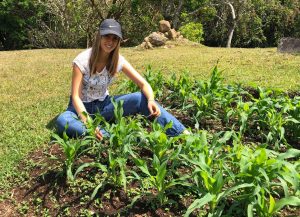by

When the coronavirus pandemic began in March, María Suarez, junior in bioengineering, left Penn’s campus and returned home to Costa Rica. What should have been the final weeks of club activities, social events and end-of-year celebrations shifted to months spent at home, far away from Philadelphia. But Suarez, like many others, wanted to do something productive with her time in quarantine. Drawing on her bucolic roots, she decided to start a garden.
“I was born and raised in a very rural area,” Suarez says. “There is a huge river in my backyard where I learned how to count by throwing pebbles in the river with my mother and sister. Nature is a big part of my life, and it’s really shaped my personality. As a child, I planted herbs, like basil, mint and oregano, with my parents. When you are close to the land like this, gardening was something that grew naturally out of our lifestyle.”
As the spring semester shifted into summer, Suarez returned to her love of planting and embarked on an ambitious project to grow a vegetable garden in her backyard. Unlike the smaller herb gardens she had grown as a child, this vegetable garden required deeper horticultural knowledge as well as intense work under the hot sun.
“To begin the garden, I had to clear the land I wanted to use and remove all the grass and stones from the soil,” Suarez shares. “It was the dry season in Costa Rica and the ground was very difficult to work with.”
After clearing the land, Suarez had to bring nutrients back into the soil of her garden plot. Luckily, her family has been maintaining a natural compost pile for many years.
“Basically, the compost pile is a hole in the ground where we put our natural food waste. There are worms and animals there that help us naturally decompose the waste and they produce a very nutrient rich soil.” Suarez explains. “The compost is a five-minute walk from my garden, and I had to take at least ten trips with a wheelbarrow to bring enough back. It was a great arm workout.”
Once the soil was placed and watered, Suarez was finally able to plant her seeds. After a few days, she saw celery and zucchini plants beginning to sprout. Throughout the summer, Suarez’s crops grew well, and she was able to harvest the vegetables and share them with her family.
“It was very fulfilling to see the products of my efforts,” Suarez says.
Read the full story on the Penn Engineering blog.
